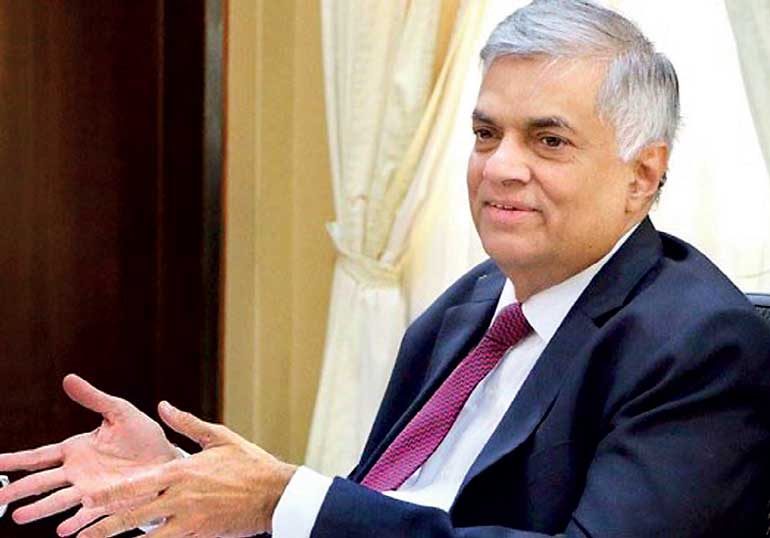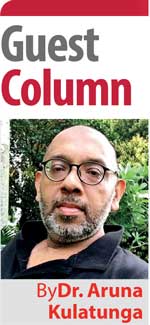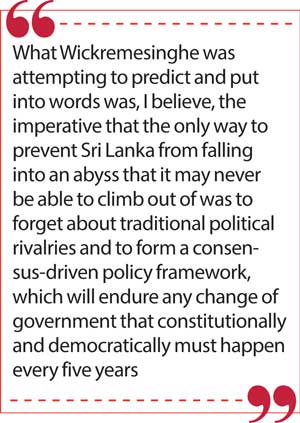Tuesday Mar 03, 2026
Tuesday Mar 03, 2026
Tuesday, 17 May 2022 02:33 - - {{hitsCtrl.values.hits}}

Prime Minister Ranil Wickremesinghe
So, Ranil Sriyan Wickremesinghe, at 73 years of age, swore an oath before President Gotabaya Rajapaksa that, again, for the sixth time, he will take over the mantle of leading the Government of Sri Lanka as its 26th Prime Minister. 
This was not a result of a democratic election or passing the baton from a party leader to his/her anointed deputy, but the result of a convoluted and forced series of incidents that seemingly catapulted a single member of parliament holding no other support in the parliament of 225 members, to gain, apparently, the support of the majority of the parliament of at least 113 members. Wickremesinghe, whose knowledge of global political history is unparalleled amongst his cohorts, was to remind a BBC reporter that some 90 years ago, Winston Churchill also became Prime Minister of Britain, with only four members of his party represented in parliament. Britain was in a crisis then, as we are now.
Let’s not discuss the deal, deals, or deals within the deals that may have taken place or may not have taken place. But let’s start with a speech Wickremesinghe made in Parliament on 20 January where he said, and I quote: “We have come to the end of politics. If we go by the words of Francis Fukuyama, it is a question of the end of politics. But that does not mean the end of the parliament. We in parliament must think afresh. We must discuss how to bring about long-term policies which would help us find solutions to the problems affecting the public. Thereafter, we can go for elections and ask people to decide who, or which party could do better. Japan did so, Great Britain is doing so. India and Canada do the same. Why can’t we do it here? If we can arrive at a consensus, we will be able to usher in a new era.”
Fukuyama, an American political scientist, did not discuss the end of politics but in his seminal volume, ‘the end of history and the last man’ argued that Western liberal democracy will be the endpoint of mankind’s ideological evolution and the universal acceptance of liberal democracy will be the final form of human government.
Fukuyama expanded his essay first published in the summer of 1989 just before the fall of the Berlin Wall when the ideological fractions seem to have almost disappeared with the fall of the Soviet Union and only a few countries including China which was yet to embark on the economic strides that have made it a global giant, still clinging to socialism and central command.
A contemporary and a teacher of Fukuyama, Samuel P. Huntington, perhaps got it more correct when he wrote the future will be decided by a clash of civilisations that will be fuelled by cultural and religious identities and that the future wars would be fought not between countries but between cultures.
Huntington’s thesis was a contractarian view, published after Fukuyama. Ultimately, the teacher was proved right.
Wickremesinghe paraphrasing Fukuyama’s End of History as the end of politics was fully aware that liberal democracy has not been the panacea that it was promised to be by Fukuyama nor has Huntington’s dire warnings become a full reality. The world, as it has always been, is still in flux.
What Wickremesinghe was attempting to predict and put into words was, I believe, the imperative that the only way to prevent Sri Lanka from falling into an abyss that it may never be able to climb out of was to forget about traditional political rivalries and to form a consensus-driven policy framework, which will endure any change of government that constitutionally and democratically must happen every five years.
Economically Sri Lanka has suffered simply because, while democratic change within the Government must take place, economic stability can never be achieved unless long-term planning happens and is implemented. In countries where rapid growth has happened like China and India, in recent times, the main impetus for this growth has been the long-term planning put in place by the country’s non-political planners. It is difficult to envisage that with the amount of political interference that is now ingrained into Sri Lanka’s administrative fabric that there are any non-political planners still within us.
Therefore, if the Parliament as a single unit can agree on a 25-year national policy framework that deals with at least three primary sectors of the economy – energy, food, and national security, our planners can get quickly to work given the blessings of all political parties. If we get these three sectors right the balance of payment, the fiscal economy, and the real economy will have the political and the economic stability that these need to recover.
Such a framework of policies for them to endure and to get accepted by the international community, who Sri Lanka needs to invest in the country if we are to come out of the abyss that we are in now must include sustainable policies that are in tune with global SDGs. Chief among these would be to rapidly break out from our dependence on fossil fuels which are nearly 90% of Sri Lanka’s total energy usage. These fossil fuels are imported. Money that can be spent on developing hospitals, schools, universities, and IT infrastructure we need, we spend burning fuel and adding carbon to the environment.
The country is blessed with abundant sun and wind. Despite the CEB’s mafioso petulancy to accept that renewable energy can and will power more than 70% of the country’s needs, we need to go beyond that 70% target much sooner than earlier planned. Meanwhile, when we open vehicular imports, we must also allow only EV vehicles to be imported thereby cutting down on more use of fossil fuels. There will be a substantial decrease in dollar outflow with another important aspect- while there is a dollar outflow for renewable energy where Sri Lanka will have to import solar panels and wind turbines, this will be at a fixed cost amortised over a period of usually 22 years where the financial planners will know exactly how much money has to be spent and when it has to be spent. With fossil fuels, coal, and natural gasses Sri Lanka is at the mercy of the vagrancies of those markets.
Long-term food policy must consider whether we continue with chemical fertiliser or switch to organic fertiliser. The catastrophic decision to change to organic fertiliser was not due to any scientific or health-related issue but simply a lack of foreign currency to pay for the chemical fertiliser imports. There is an answer for this. Sri Lanka is blessed with two other main resources that are today exploited without value addition or benefit to the country.
In Pulmudai, about 30 miles north of Trincomalee, Sri Lanka has an abundant supply of high-grade ilmenite ore which is being replenished by the sea without us having to mine it. Somewhere in the interior of the country in a little village called Eppawala, a whole mountain of rock phosphate juts out. Rock phosphate as a raw material is not soluble in water and therefore is not suitable to directly use as a fertiliser. Another ingredient is necessary to turn rock phosphate into usable fertiliser and that is a highly caustic sulphuric acid. Ilmenite is the raw material used in the production of titanium dioxide, a vital ingredient in the construction industry used to strengthen bonds between surfaces to produce paints and with a little bit more energy converted to titanium metal. A by-product of this process is sulphuric acid, the missing ingredient we need to turn our rock phosphate into usable fertiliser.
There is another missing ingredient and that is the steady-state energy needed to convert ilmenite into titanium dioxide and to run the rock phosphate to the fertiliser process. If we connect all these dots together it is possible to save millions and possibly billions of foreign exchanges by putting up a power plant and two factories adjoining each other. The power plant to be a steady-state can either be natural gas or wind and solar power with proper battery backup.
With a proper fertiliser supply, we will then have to tightly regulate and wean our farmers away from overuse of fertilisers gradually reintroducing organic fertiliser where appropriate. But more than that what is most necessary is the modernisation of our post-harvest technologies, distribution, and storage of produce. It is not a secret that nearly 40% of our produce gets wasted post-harvest.
Policy frameworks, therefore, must look at and encourage long-term storage facilities, island-wide logistics that are state-supported but privately run, and more penetration into the village level by large supermarket chains which can support retired pensioners to start up ‘corner shops’ providing them with basic facilities like refrigeration and shelving and pass on the benefits of central purchasing and packaging to the villagers as much as being enjoyed in urban centres.
We must accept and realise that Sri Lanka must remain strictly neutral while being a friend to all our neighbours at the same time and give equal opportunities on a level playing field to anyone who wants to invest in Sri Lanka. The past experiences of favouring one nation against another have directly contributed to the economic instability that we are now facing. Sri Lanka should be the Switzerland of South Asia. To be the Switzerland of South Asia we must maintain a robust and credible defence mechanism. However, such defence mechanisms should never threaten our neighbours.
Therefore, clear policies that encompass at least these primary sectors must be agreed upon and communicated by the Parliament as its number one priority.
There will be others to achieve debt sustainability. There will be tough decisions to make, decisions we should have taken many years ago, like letting go of unsustainable, debt-ridden, and corruption-inducing state-owned enterprises like the SriLankan Airlines and CEB. One of, if not the biggest factor, of the current economic imbroglio, was the complete intransigence by the CEB to move toward renewable energy.
PUCSL has already given a confidential report to the president recommending a plan that was originally proposed in the early 2000s to break up the CEB into functional divisions and make all divisions autonomous. If not for the privatisation of CEB, at least this breakup must occur to prevent mafioso ineptitudes prevalent within this institution. Those decisions will be taken and must be taken and now is the best time to be taken. I can add more, cut down on port workers, and make the port more efficient, the same goes for the train services, the Sri Lanka Transport Board, etc.
Five months ago, Wickremesinghe described a concept that appears to be utopian at that time but is the obvious necessity today. The question is given the political intransigence and exigencies will Wickremesinghe pursue his single-mindedly as he must or will this also be another lost opportunity, you will be held accountable.